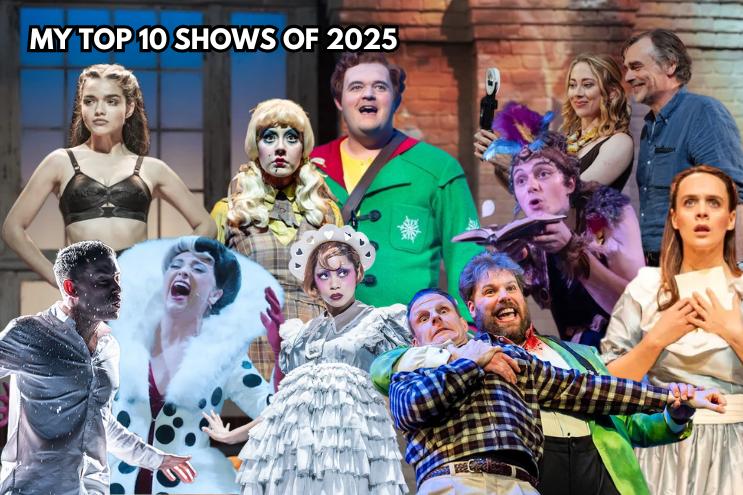Rodgers & Hammerstein’s Oklahoma! broke new ground on Broadway in 1943 as the first true book musical, where the songs and dances were seamlessly integrated into the plot to heighten the drama and momentum. The show was an instant box office sensation and ran for an unprecedented 2,212 performances, inspiring numerous award-winning revivals (including the 1998 National Theatre production starring Hugh Jackman), multiple US and UK tours, international productions and an Oscar-winning 1955 film adaptation. More recently in 2018, Daniel Fish directed a daring 75th Anniversary production at Brooklyn’s St. Ann’s Warehouse, which wowed audiences and critics alike with its insightful reflection of contemporary society and commentary on modern life. After transferring to Broadway in 2019, Fish’s production earned the Tony Award for Best Musical Revival, and enjoyed a sold-out run and US tour. It then crossed the pond to the UK, where it enjoyed another sell-out run at the Young Vic in 2022 before transferring to the West End’s Wyndham’s Theatre earlier this year. Fish’s production of Oklahoma! has received widespread critical acclaim and won several prestigious awards in the UK, including Best Musical at the Evening Standard Awards 2022, Best Musical Revival at the WhatsOnStage awards 2023 and Best Musical Revival at the Olivier Awards 2023. Hailed as the most recommended show for 2022 and 2023, Fish’s production of Oklahoma! is the show as you’ve never seen it before – re-orchestrated and reimagined for the 21st century.
In this Oklahoma! Arthur Darvill’s award winning performance of Curly interprets him as a guitar playing crooner. His vocal rendition of the classic Oh What A Beautiful Mornin’ at the top of the show is an insightful modern mix of full voice and intentional falsetto moments. Strumming his guitar with an air of arrogant uninterested ease, Darvill sets the scene for this new production of the classic musical superbly. Anoushka Lucas’s portrayal of Laurey perfectly captures her description as a headstrong woman. From her dismissive first line to Curly, “Oh, I thought you was somebody…” to the discovery of her sexuality and the stunning four-part harmony rendition of “Many A New Day,” Lucas shines as a strong young woman of the modern world. The character of Jud is perhaps the most re-imagined of all, with this production presenting him as a sympathetic outsider struggling to fit into a society that has marginalized him. As a result, Patrick Vaill’s portrayal of Jud is heart-wrenching, particularly in his vocally powerful act one highlight “Lonely Room,” where he asks the question “why Curly and not me?”
Georgina Onuorah’s portrayal of Ado Annie breaks free from the traditional stereotype of a brainless floozy and is reimagined as a young woman enjoying life to the fullest. Her iconic song, “I Cain’t Say No,” is transformed into a sex-positive anthem sung by a confident woman who knows what she wants and understands her worth. James Patrick Davis’s fun portrayal of Will Parker brings in the comic relief. His performance in “Kansas City” is practically memorable and sees him doing the two-step with every person on stage in a frantic routine that leaves him lying down resting after the song. Authentically cast, Stavros Demetraki’s portrayal of Ali Hakim, the unlucky-in-love peddler, was particularly impressive throughout and Liza Sadovy’s Aunt Eller is everything we expect from a strong matriarch.
Where this production succeeds most is in its reinterpretation. Daniel Kluger has worked wonders with the score and re-orchestrated and arranged the original 30-piece orchestra. Replicating authentic music of the period, the band is now a tight invigorating mix of seven instruments- bass, cello, fiddle, mandolin, banjo, guitar, and accordion. As the characters navigate their relationships and conflicts, they are forced to confront the darker aspects of their history and their present reality, including the legacy of slavery, the displacement of Native Americans and the ongoing struggles of minority groups. The cast enters the stage together at the top of each act and sit onstage throughout most scenes, reacting to the action around them. This becomes practically effective when Andrew Carnes draws a shotgun on Ali Hakim and we see the characters react by shying away from the gun, becoming extremely cagy and turning their heads. Similarly in Act Two as tensions rise during the box social, the characters all draw guns which leave the venerable Jud dropping his in fright and cowering in the corner. While witnessing a gun drawn is extremely distressing, it is evident from their almost instinctive reactions that these characters have experienced this before, almost expecting someone to be shot- leaving the audience to think about modern-day gun control. Sexuality is something that is played with a lot during this production. Being a young woman, Laurey is just discovering her sexuality as we meet her as she decides between Curly and Jud. In addition, Ado Annie sings a verse of I Cain’t Say No to Laurey seducing her to the point of leaving Laurey on edge and wanting more. Going one step further, to punctuate intimate moments between Curly and Laurey, the stage is suddenly drenched in rich greens and reds with a seductive slow running baseline during favourite The Surrey with the Fringe on Top. During the scene where Curly visits Jud in his smokehouse, the theatre is in pitch darkness (even the exit signs are turned off). This really makes the audience listen as Curly almost convinces Jud to self-harm, a video camera is brought on and the darkness is shattered by the face of Jud on the back wall in tears before Curly launches into Pore Jud Is Daid. With nods to homoerotism as Curly almost seduces Jud into killing himself, the darkness really lays bare just how manipulative Curly is. During Curly and Laurey’s wedding scene at the end of Act Two, traditionally Jud arrives with a knife and tries to stab Curly but falls on his own knife. This is followed by a short mock trial scene where the wedding guests agree it was self-defense and send Curly and Laurey happily on their honeymoon. In this production, Jud presents Curly with a gun. Jud moves towards the happy couple and Curly shoots him at short range, spattering blood all over himself and Laurey’s white wedding clothes. As Jud lies dying, the courtroom scene occurs at a slow pace as Aunt Eller convinces the community to let Curly off- a chilling example of how the judicial system often fails outsiders and minorities. Covered in blood and reeling from the death of Jud, the actors then sing a reprise of the title song. Stamping their feet in blind patriotism, anger and with a feverish passion. As they stamp it out and turn O-K-L-A-H-O-M-A into a chant, it is easy to imagine these characters from middle America being ignited and storming the capital building, stripping rights from the trans community, or banning drag queens. As a result, the ending of the Oklahoma! leaves you breathless.
If you’re a fan of classic musical theatre then this version of Oklahoma! is a must-see. This bold and innovative take on the beloved musical challenges traditional notions of what a Broadway show can be, while still maintaining the heart and soul of the original story. A relevant and timely production that will leave you thinking long after the curtain falls. So if you’re ready for a fresh and exciting take on a beloved classic, Daniel Fish’s Oklahoma! is not to be missed.
Reviewed by Stuart James





